MENU
(April 25, 2016 - by Harold Goerzen) At San José de Chamango in Ecuador’s earthquake zone, an 85-year-old woman, her fractured arm wrapped up with a temporary splint made of sticks of bamboo, arrives a week after sustaining her injury, seeking help from Reach Beyond’s medical team.
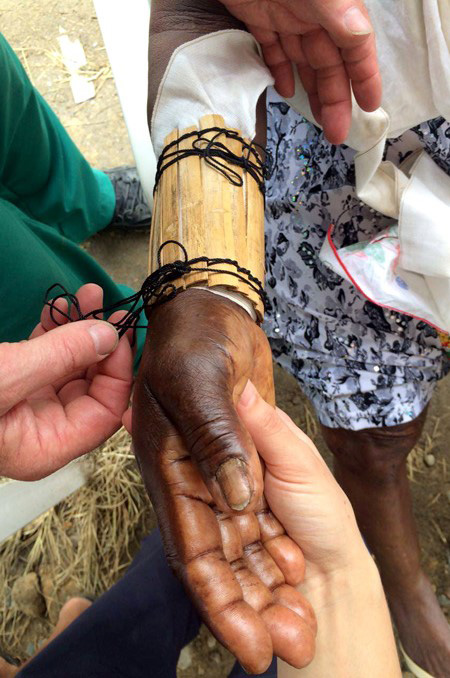 Another patient shows up with an unusual disease called erysipelas—a bacterial infection characterized by large, raised red patches on the skin along with a fever. He is diagnosed and carefully treated, avoiding future complications.
Another patient shows up with an unusual disease called erysipelas—a bacterial infection characterized by large, raised red patches on the skin along with a fever. He is diagnosed and carefully treated, avoiding future complications.At Pueblo Nuevo, a concerned young couple comes with their month-old baby who has a racing heartbeat, rapid breathing and a crackle in both lungs. The child gets immediate hospital care.
An 8-year-old child who had fallen from a considerable height is brought to the Atacames hospital with a double fracture in his upper arms and both wrists, and he is sent straight to surgery.
These are just a few examples of the patients seen by two emergency medical response teams sent from Reach Beyond’s Hospital Vozandes-Quito since a devastating earthquake struck Ecuador’s coastal region on Saturday, April 16. The latest statistics are 654 dead, 16,600 injured and 25,000 homeless, but these numbers continue to rise.
Based in the resort city of Atacames, the initial teams have traveled one to two hours to hard-hit towns such as Muisne, Chamanga, Pueblo Nuevo and San Gregorio, setting up mobile medical clinics in refugee camps or in the communities.
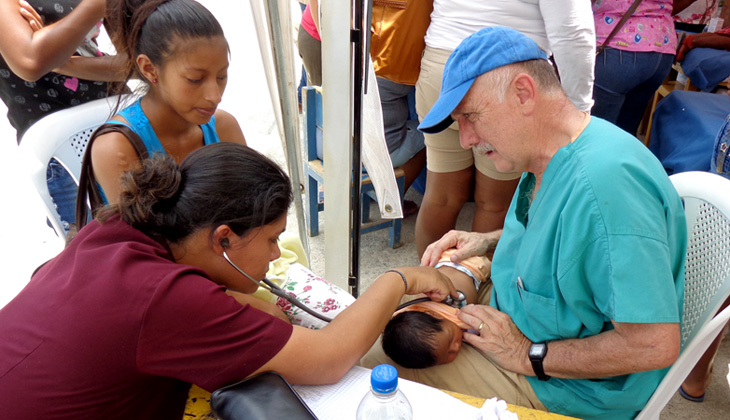 “We want this to be a chance to lift up the name of Jesus by how we act, work and speak,” related Dr. Steve Nelson, a member of the first Reach Beyond medical crew that went to the quake zone. “We will start forming the next team as soon as we have some information as to how we can help in this ongoing tragedy.”
“We want this to be a chance to lift up the name of Jesus by how we act, work and speak,” related Dr. Steve Nelson, a member of the first Reach Beyond medical crew that went to the quake zone. “We will start forming the next team as soon as we have some information as to how we can help in this ongoing tragedy.”Hermann Schirmacher, who is coordinating the second group, was impressed by a man named Pedro whom he came across on the streets of Chamanga, working with his son, father and other family members.
“They were pulling nails out of the wood that they could rescue from their destroyed home,” Schirmacher said. “He sat down and we talked. He shared about the night of the event and how thankful he was to God that his family survived. He told me with tears in his eyes, ‘The most important thing is that we are alive. We lost everything, but we will continue on. I also saw how the houses from my neighbors collapsed. It’s a miracle that in this area we didn’t have any deaths—just injuries.’”
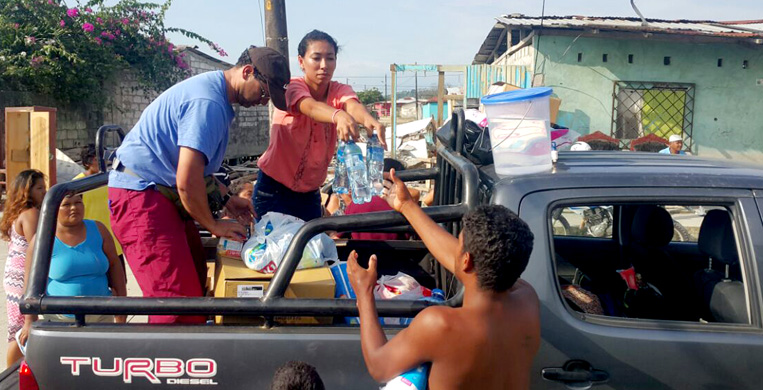 Geoff Kooistra, director of media services at Radio Station HCJB, said the city of Quito has seemed “more subdued than normal” since the quake. People across the city felt the temblor, but it caused little damage and no injuries in the capital.
Geoff Kooistra, director of media services at Radio Station HCJB, said the city of Quito has seemed “more subdued than normal” since the quake. People across the city felt the temblor, but it caused little damage and no injuries in the capital.“At the radio station (HCJB) we are broadcasting government notifications, offering special programs with news updates, prayers for the people affected by the quake and giving messages of hope from the Bible,” he noted.
The mission’s two FM repeater stations in the areas hardest hit by the quake are still on the air despite massive damage in the vicinity. Staff members at HCJB 2, the mission’s partner station in the coastal city of Guayaquil, are working with the emergency relief arm of a group of evangelical churches to bring immediate relief and also help with rebuilding efforts.
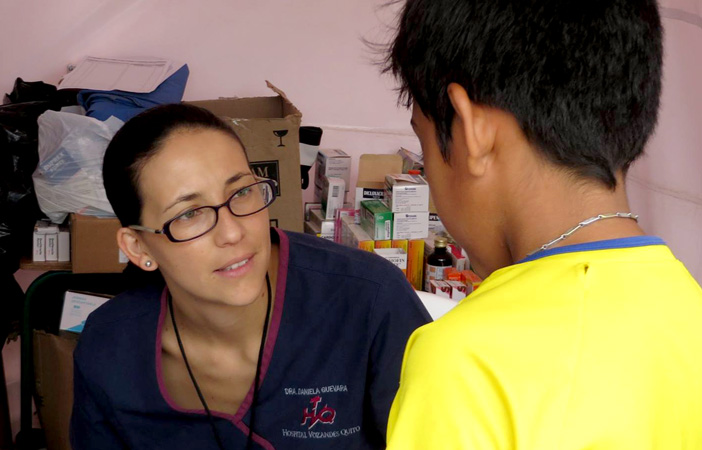 “The group expects to operate for at least one year,” Kooistra explained. “Pray that people would continue to be generous throughout the coming months. The infrastructure of roads, electricity, water and sanitation needs to be repaired. It will take months to rebuild the homes, businesses and hotels that were destroyed. It’s easy to be overwhelmed by all the work that needs to be done before the area can return to some semblance of normalcy.”
“The group expects to operate for at least one year,” Kooistra explained. “Pray that people would continue to be generous throughout the coming months. The infrastructure of roads, electricity, water and sanitation needs to be repaired. It will take months to rebuild the homes, businesses and hotels that were destroyed. It’s easy to be overwhelmed by all the work that needs to be done before the area can return to some semblance of normalcy.”In addition to the medical personnel, the second team was accompanied by two pastors and three counselors who ministered on the weekend to traumatized children.
Team members César Cortez and Darrell Holden also checked on two communities where Reach Beyond’s Community Development staff had helped install clean water systems in previous years. The projects—maintained by trained people of the community—were functioning well.
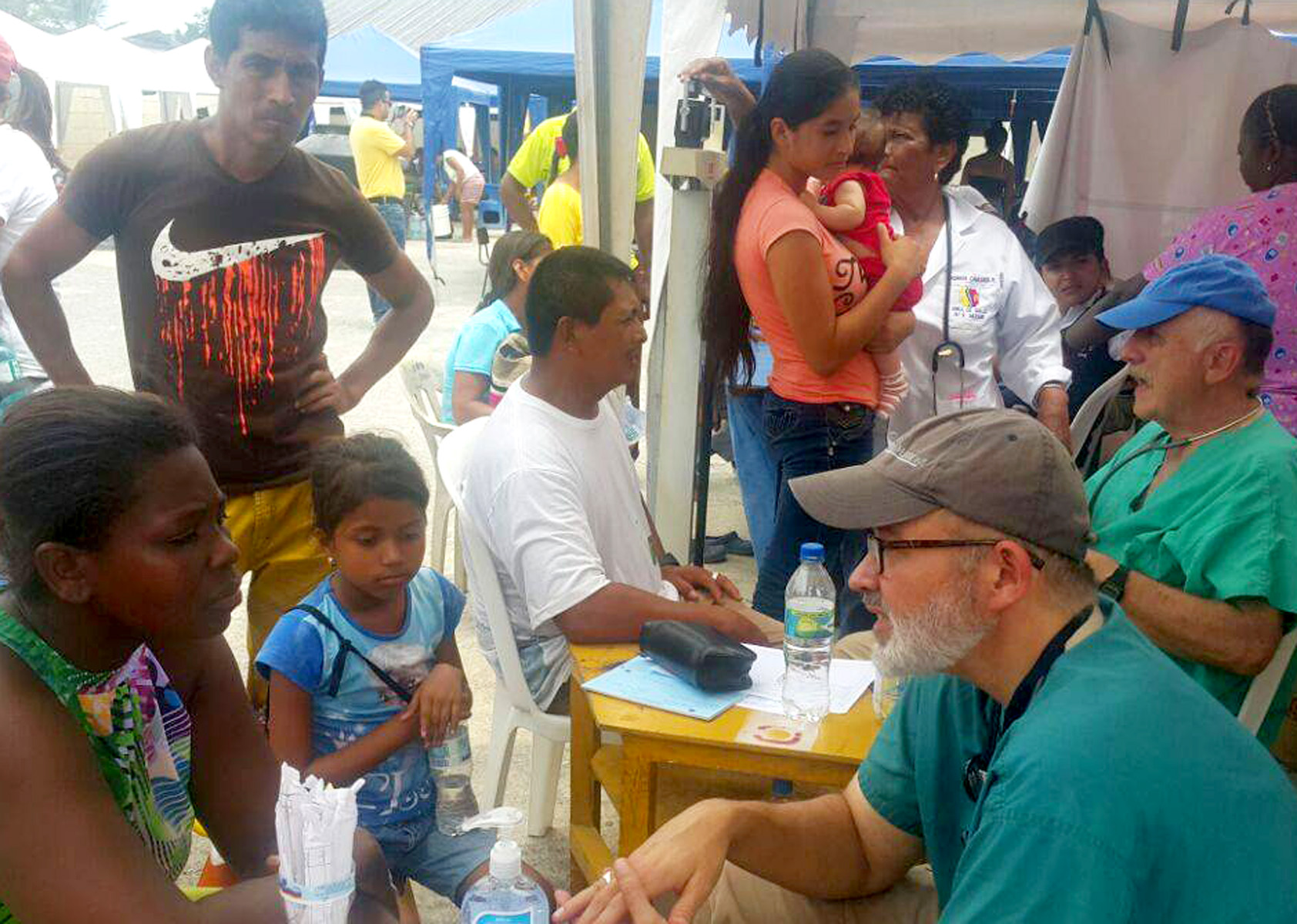 Cortez said the community president in Balsalito expressed gratitude, and not merely for the clean water provided by the system. Additionally, Cortez said Reach Beyond’s community development thrust has taken hold in the town, and “now they are helping each other. The entire community is fixing those houses that are broken…. They’re going by turn to every house, so they appreciate not just the water, but how we trained them.”
Cortez said the community president in Balsalito expressed gratitude, and not merely for the clean water provided by the system. Additionally, Cortez said Reach Beyond’s community development thrust has taken hold in the town, and “now they are helping each other. The entire community is fixing those houses that are broken…. They’re going by turn to every house, so they appreciate not just the water, but how we trained them.”He added that there is shortage of clean water in the region, especially since the quake, and opportunities may open to help with future water projects in the area. Reach Beyond has assisted with 127 water projects in Esmeraldas province alone in the last 20 years.
“Our goal is to have a holistic ministry,” Cortez said. “We want to help take of people’s physical, psychological and spiritual situations.”
Sources: Reach Beyond, Reuters
